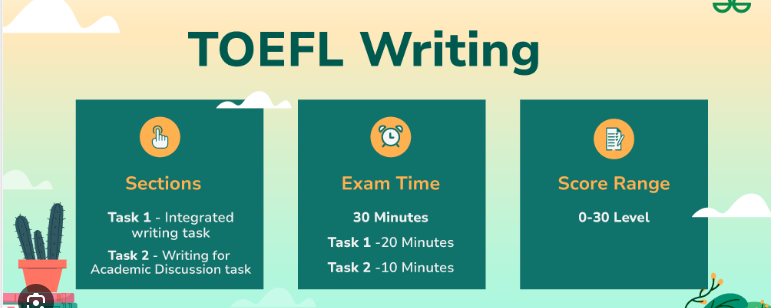Welcome to TakeMyTOEFLExam.com. If you're here, chances are you're preparing for the TOEFL exam, and the writing section is on your mind. Don't worry we've got you covered. In this guide, we'll walk you through everything you need to know to ace the TOEFL Writing Section, offering tips, strategies, and some insider advice to help you succeed.
What is the TOEFL Writing Section?
The TOEFL (Test of English as a Foreign Language) exam is designed to measure your ability to use and understand English at a university level. One of the key components of the TOEFL is the Writing Section, where you'll demonstrate your ability to write clear, coherent, and well-organized essays in English.
The TOEFL Writing Section consists of two tasks:
-
Integrated Writing Task: You’ll read a passage, listen to a related lecture, and then write a response to a question about what you read and heard. This task evaluates your ability to combine information from both sources and organize it into a well-structured essay.
-
Independent Writing Task: In this task, you’ll be asked to write an essay on a specific topic based on your personal opinion. It tests your ability to develop an argument, provide supporting reasons, and express yourself clearly.
How to Succeed in the TOEFL Writing Section
While the TOEFL Writing Section might sound challenging, with the right preparation and strategy, you can score highly and feel confident in your abilities. Here are some key tips to help you master the writing section:
1. Understand the Format
Before you start practicing, make sure you fully understand the format of the writing section. Familiarize yourself with the tasks, the time limit (20 minutes for the Integrated Task, 30 minutes for the Independent Task), and the types of questions that could be asked. Knowing what to expect will help you stay calm and organized during the test.
2. Practice Time Management
The TOEFL Writing Section is timed, so it's important to manage your time wisely. You have 20 minutes for the Integrated Writing Task and 30 minutes for the Independent Writing Task. Practice writing within these time limits to build your speed and improve your ability to produce quality writing in a short period.
3. Develop Your Writing Skills
The best way to improve your writing is through consistent practice. Write essays, summaries, and responses to TOEFL-style prompts every day. Focus on improving your grammar, sentence structure, and vocabulary. Be sure to use a variety of sentence structures and advanced vocabulary to showcase your proficiency in English.
4. Focus on Organization
Good writing isn’t just about having strong grammar; it’s about presenting your ideas clearly. Structure your essays logically with an introduction, body paragraphs, and a conclusion. In the Integrated Writing Task, ensure that your essay clearly distinguishes between information from the reading and the lecture. In the Independent Writing Task, each paragraph should focus on one main idea, with examples and explanations to support your argument.
5. Use Clear and Concise Language
Clarity is key in the TOEFL Writing Section. Avoid overly complicated sentences or ideas that are difficult to understand. Aim for simplicity and directness, ensuring that every sentence adds value to your argument. This will make it easier for the examiners to understand your ideas and will help you achieve a higher score.
6. Review Sample Essays
Reading sample TOEFL essays can help you understand what a high-scoring essay looks like. Pay attention to the structure, language use, and how ideas are developed. You can find examples of both the Integrated and Independent Writing tasks online, so take some time to study them.
7. Practice Writing Under Pressure
It’s normal to feel nervous on exam day, so practicing writing essays under timed conditions can help reduce anxiety. Simulate the exam environment as closely as possible by setting a timer and completing practice tasks. This will help you become more comfortable writing quickly and efficiently.
8. Seek Feedback
Having someone review your writing is incredibly helpful. A teacher, tutor, or even a friend who is proficient in English can give you constructive feedback on your essays. They can point out areas where you can improve, whether it’s your grammar, organization, or overall argumentation.
Common Mistakes to Avoid in the TOEFL Writing Section
-
Ignoring the prompt: Make sure to address all aspects of the question. Missing key details or writing off-topic can hurt your score.
-
Poor time management: If you don’t allocate enough time to plan and review your writing, your essay might be rushed or incomplete.
-
Overcomplicating sentences: Keep your writing clear and easy to follow. Simple, direct sentences often work better than complex ones.
-
Weak organization: A disorganized essay is hard to follow. Stick to a clear structure and ensure each paragraph serves a distinct purpose.
What Is a Good Score on the TOEFL Writing Section?
The TOEFL Writing Section is scored on a scale from 0 to 30. Here’s what each range typically indicates:
-
0-16: Limited writing ability. Your essay may lack organization, contain numerous errors, or fail to address the prompt.
-
17-23: Competent writing ability. Your essay may have a few errors, but it effectively addresses the prompt with a reasonable level of organization and clarity.
-
24-30: Excellent writing ability. Your essay is well-organized, clearly written, and free of significant errors. You effectively support your argument with relevant examples.
Frequently Asked Questions (FAQs)
1. How long should my TOEFL essays be?
-
For the Independent Writing Task, aim for about 300-350 words. For the Integrated Writing Task, about 150-225 words is typical.
2. Can I use notes during the TOEFL Writing Section?
-
Yes, you can take notes during both the Integrated and Independent Writing tasks. Use them to organize your thoughts and outline your essay.
3. What is the best way to practice for the TOEFL Writing Section?
-
Practice regularly by writing essays, reading TOEFL sample responses, and reviewing grammar rules. Time yourself to get used to the pressure of the exam.
4. Can I use personal experiences in the Independent Writing Task?
-
Yes! The Independent Writing Task asks for your opinion, so using personal experiences or examples is a great way to strengthen your argument.
5. How can I improve my grammar for the TOEFL Writing Section?
-
Review grammar rules, practice writing sentences, and get feedback on your work. The more you practice, the more confident you’ll become with grammar.
Final Thoughts
Preparing for the TOEFL Writing Section doesn’t have to be stressful. With a clear understanding of the task, smart preparation, and consistent practice, you can achieve the high score you're aiming for. Remember, quality writing takes time, so start preparing early and keep refining your skills. You’ve got this.
For more tips, practice tests, and personalized guidance, feel free to explore our resources at TakeMyTOEFLExam.com. We’re here to support you on your journey to TOEFL success.


